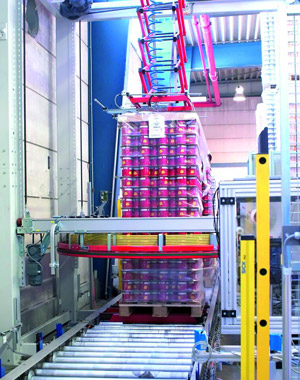WEIDENHAMMER
German packaging manufacturer invests more than EUR 30m in 2010 / EUR 10m earmarked for plastics division
 Weidenhammer’s production lines in Hockenheim / Germany (Photo: Weidenhammer) |
Germany’s Weidenhammer Packaging Group (WPG, Hockenheim; www.weidenhammer.de) will invest more than EUR 30m in 2010 to expand its European production sites. Roughly a third of the money is earmarked for modernising existing buildings, WPG reports, adding that the remainder will go towards new or upgraded machinery and production lines. "We constantly invest in our factories and machinery, for instance, in the expansion of our production facilities and the ongoing improvement of our hygiene standards," said group CEO Ralf Weidenhammer, adding that, "It's the only way we can maintain our position as the market and technology leader."
At the end of September, the company celebrated the modernisation of one of its two composite can plants, located at WPG headquarters in Hockenheim. In the future the site will boast seven production lines capable of churning out 10 different kinds of composite cans as well as four lines for composite drums. At its site in Lübeck / Germany, WPG also recently installed a new line to manufacture the “peel-off top” cap for its composite cans.
Another EUR 10m are destined for the group’s plastics business, Weidenhammer Plastic Packaging (WPP), to enable it to increase capacity at its site in Zwenkau / Germany. The expansion is co-funded by the European Regional Development Fund (ERDF) and the German federal state of Saxony. This summer, WPP added another 5,000 m2 of production space at the site, bringing it to a total of 9,000 m2.
Weidenhammer is also investing at its other European sites. After almost nine months of construction, the company resumed production at its site in Inofita / Greece at the beginning of May. Altogether, WPG forked out some EUR 6.5m to upgrade and expand this line – see Plasteurope.com of 10.09.2010. The upgrade involved a tripling of production space to about 4,000 m2. WPG hopes the modernised and expanded facility will spur growth in southern Europe.
The group is also about to begin building a new 10,000 m2 plant for the manufacture of composite cans at its site in Bradford / UK, which it hopes to commission in mid-2011. At the same time, WPG is expandings its composite can business in Switzerland and Russia. The group had acquired Greiner Packaging’s (Diepoldsau / Switzerland) composite can business in mid-2009 and integrated that capacity into its plants in Germany and France. WPG’s first Russian-manufactured composite can came off the belts of its plant in Vladimir about a year ago – see Plasteurope.com of 25.02.2010. The line is operated by a joint venture with Greiner Packaging Russia.
WPG operates 12 plants throughout the world, with a workforce of about 960. Its clients include industry giants Unilever Bestfoods, Nestlé and Procter & Gamble. Group management expects revenues to reach EUR 200m this year.
At the end of September, the company celebrated the modernisation of one of its two composite can plants, located at WPG headquarters in Hockenheim. In the future the site will boast seven production lines capable of churning out 10 different kinds of composite cans as well as four lines for composite drums. At its site in Lübeck / Germany, WPG also recently installed a new line to manufacture the “peel-off top” cap for its composite cans.
Another EUR 10m are destined for the group’s plastics business, Weidenhammer Plastic Packaging (WPP), to enable it to increase capacity at its site in Zwenkau / Germany. The expansion is co-funded by the European Regional Development Fund (ERDF) and the German federal state of Saxony. This summer, WPP added another 5,000 m2 of production space at the site, bringing it to a total of 9,000 m2.
Weidenhammer is also investing at its other European sites. After almost nine months of construction, the company resumed production at its site in Inofita / Greece at the beginning of May. Altogether, WPG forked out some EUR 6.5m to upgrade and expand this line – see Plasteurope.com of 10.09.2010. The upgrade involved a tripling of production space to about 4,000 m2. WPG hopes the modernised and expanded facility will spur growth in southern Europe.
The group is also about to begin building a new 10,000 m2 plant for the manufacture of composite cans at its site in Bradford / UK, which it hopes to commission in mid-2011. At the same time, WPG is expandings its composite can business in Switzerland and Russia. The group had acquired Greiner Packaging’s (Diepoldsau / Switzerland) composite can business in mid-2009 and integrated that capacity into its plants in Germany and France. WPG’s first Russian-manufactured composite can came off the belts of its plant in Vladimir about a year ago – see Plasteurope.com of 25.02.2010. The line is operated by a joint venture with Greiner Packaging Russia.
WPG operates 12 plants throughout the world, with a workforce of about 960. Its clients include industry giants Unilever Bestfoods, Nestlé and Procter & Gamble. Group management expects revenues to reach EUR 200m this year.
15.10.2010 Plasteurope.com [217527-0]
Published on 15.10.2010

 German version of this article...
German version of this article...